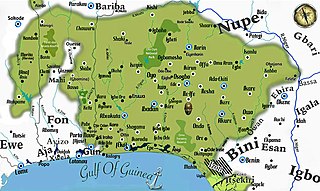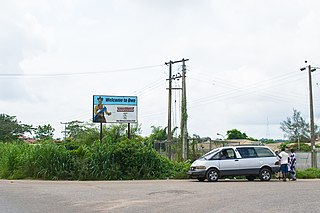
Ifẹ̀ is an ancient Yoruba city in south-western Nigeria, recent in-depth archeologically estimates suggest Ife's founding to be between the 10th century BC and 6th century BC and is widely agreed upon by historians to be the oldest amongst the classical and post-classical Yoruba city-states. The city is located in present-day Osun State. Ifẹ̀ is about 218 kilometers northeast of Lagos with a population of over 500,000 people, which is the highest in Osun State according to population census of 2006.

Osogbo is a town in Nigeria. It became the capital city of Osun State in 1991. Osogbo city seats the Headquarters of both Osogbo Local Government Area and Olorunda Local Government Area. It is some 88 kilometers by road northeast of Ibadan. It is also 108 kilometres (67 mi) by road south of Ilorin and 108 kilometres (67 mi) northwest of Akure. Osogbo shares boundaries with Ikirun, Ilesa, Ede, Egbedore, Ogbomosho and Iragbiji and it is easily accessible from any part of the state because of its central nature. It is about 48 km from Ife, 32 km from Ilesa, 46 km from Iwo, 48 km from Ikire and 46 km from Ila-Orangun; The city had a population of about 500,000 people and an approximate land area of 2875 km2 the postal code of the area is 230.

Ilorin is the capital city of Kwara State located in the North Central region of Nigeria. As of the 2006 census, it had a population of 777,667, making it the 7th largest city by population in Nigeria. Surrounding the historic central district with its traditional single-story red-mud houses with thatched straw roofs and numerous mosques, all protected by a mud wall, the modern city is an industrial, commercial, and educational centre.

Yorubaland is the homeland and cultural region of the Yoruba people in West Africa. It spans the modern-day countries of Nigeria, Togo and Benin, and covers a total land area of 142,114 km2 or about 60% of the land area of Ghana. Of this land area, 106,016 km2 (74.6%) lies within Nigeria, 18.9% in Benin, and the remaining 6.5% is in Togo. Prior to European colonization, a portion of this area was known as Yoruba country. The geo-cultural space contains an estimated 55 million people, the majority of this population being ethnic Yoruba.

Owo is a local government area in Ondo state, Nigeria. Between 1400 and 1600 CE, it was the capital of a Yoruba city-state. The local government area has a population of 222,262 based on 2006 population census.

Kwara State is a state in North Central Nigeria, bordered to the east by Kogi State, to the north by Niger state, and to the south by Ekiti, Osun, and Oyo states, while its western border makes up part of the international border with Benin Republic. Its capital is the city of Ilorin and the state has 16 local government areas.
The Ìgbómìnà are a subgroup of the Yoruba ethnic group, which originates from the north central and southwest Nigeria. They speak a dialect also called Ìgbómìnà or Igbonna, classified among the Central Yoruba of the three major Yoruba dialectical areas. The Ìgbómìnà spread across what is now southern Kwara State and northern Osun State. Peripheral areas of the dialectical region have some similarities to the adjoining Ekiti, Ijesha and Oyo dialects.

Efon-Alaaye is a town in the Ekiti State of southwestern Nigeria, inhabited by the Yoruba people. The population in 1983 was over 100,000. It belongs to Efon Local Government, one of the largest local governments in Ekiti State.
Offa is a city in Kwara State of Nigeria, with a population of about 166,112 inhabitants. The town is noted for its weaving and dyeing trade, using vegetable dyes made from locally grown indigo and other plants. Offa is well known for cultivation of sweet potatoes and maize which also formed part of the favourite staple foods of the indigenes in the town. Cattle, goats and sheep are also raised there. The main religions practiced in the town are Islam, Christianity and traditional religions.

Kaiama is a Local Government Area and town in northwestern Kwara State, Nigeria. Its headquarters are in the town of Kaiama.
Oke Ero is a Local Government Area in Kwara State, Nigeria. Its headquarters are in the town of Iloffa. Other Major towns in Oke Ero are Odo-Owa, Idofin, Ekan Nla, Ayedun, Erin Mope, Egosi, Imode, Idofin Odo-Ase, Kajola and Ilale. The first executive chairman of Oke-Ero is the late Otunba Moses Afolayan, while the second was Barrister Kayode Towoju.
Esa-Oke is a Yoruba town located at the Obokun Local Government Area of the Ijesa North Federal Constituency of Ife/Ijesa Senatorial District of Osun State, South-West of Nigeria. It is a native Ijesa (Ijesha) community and shares boundaries with other towns namely: Oke-Imesi, Imesi-ile, Ijebu-Ijesa, Esa-Odo, Efon-Alaaye. Omiran Adebolu, a member of the Olofin family of Ile-Ife, though disputably, was believed to have founded Esa-Oke after he left Ile-Ife in 1184 A.D.
Ileogbo is the headquarters of Aiyedire Local Government in Osun State, Nigeria. It is situated midway between Ibadan and Osogbo, the capitals of Oyo and Osun State. Ibadan is about 44 km to the south of Ileogbo while Osogbo is about 42 km to its north, Oyo 40 km to its west, while Gbongan and Ife are located to the east of the town.

Ajasse Ipo is an ancient town in Igbomina-Yoruba land of Kwara State. Ajasse Ipo is sometimes spelt as Ajase-Ipo and is also known as Ajasse or Ajasepo. It is one of the prominent towns in Irepodun Local Government Area of Kwara State. Ajasse Ipo is situated in the northeastern part of Yoruba land in northcentral Nigeria and consists of other different villages such as Eleyoka, Amberi, Falokun, Araromi etc. The present ruler of Ajasse Ipo also referred to as Olupo, is Oba Ismail Atoloye Alebiosu.
Ipetumodu () is a city in Osun State, in the southwestern part of Nigeria. It is the headquarters of the Ife North local government. The city is under the leadership of traditional ruler with the title of Apetumodu, which means "one who killed an antelope for sacrificial purposes for Odu".

Ogere, is an ancient town in the present Remo Division of Ogun State, Nigeria. The town was founded circa 1401 A.D. Ogere is part of the Ikenne Local Government Area of Ogun State.
The Okun people are a Yoruba speaking people found majorly in Kogi, but with settlements in Kwara, Ekiti, and Ondo states of Nigeria. Their dialects are generally classified in the Northeast Yoruba language (NEY) grouping. They are collectively called "Okun", which in Okun dialects could mean "Sorry", "Well-done", or as an all-encompassing greeting. Similarly, this form of greeting is also found among the Ekiti and Igbomina groups of Yoruba people.
The Isha sometimes spelt Ica, and Itcha are a relatively small group of the Yoruba people, situated in the western parts of middle Benin, West Africa, especially in the town of Bantè and other surrounding communities in the Collines Department.
Omu-Aran the Head Post of Igbomina land, is a town in the Nigerian state of Kwara. It originated from Ife and currently the local government headquarters of Irepodun local government. Omu-Aran is about 8 kilometers away from Aran-Orin.










